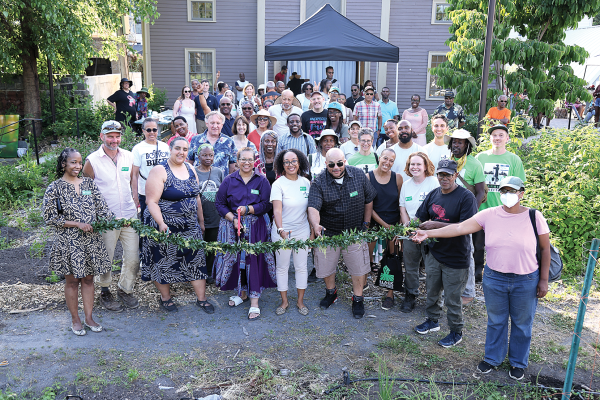June 20, 2024

One of the only working farms in the city of Boston celebrated a major milestone last Thursday (June 13) as close to 100 people gathered along Norfolk Street, site of the Fowler Clark Epstein Farm, to mark the sale of the property to the Urban Farming Institute (UFI) by Historic Boston, Inc.
Once known as a “creepy,” derelict property, the site has been transformed into a dynamic space that churns out fresh and affordable produce for neighbors in Mattapan and other purchasers.
Historic Boston led the charge to secure the site a decade ago. UFI has managed the property for the last five years and has now, after raising $3.7 million, taken full custody of the farm.
“We’re all trying to put this space in a good place for the future and now that we know we’re here, so many of our programs can now emanate from this spot,” said Pat Spence, the president and CEO of UFI who has been with the Institute since 2014.
The Fowler Clark Epstein Farm is named after three of its former owners going back to the 19th century. Like many longtime neighbors near the Norfolk Street location, Spence can remember when the site was in such poor shape that neighbors could not even tell there was a barn attached.
When she asked how many people in the crowd who had thought of it as the neighborhood’s creepiest spot, many hands shot up.
One of the innovations that UFI has brought to the property is a new greenhouse, which allows for growing year-round crops. Given its location in a neighborhood with a significant Caribbean and African-American population, the farm’s managers prioritize catering to produce needs that aren’t traditionally available in grocery stores. Some of the popular greens they cultivate are callaloo, okra, and eggplant.
“UFI is the greatest place in the city of Boston,” says Arnetta E. Ferguson, who has been coming to UFI since “inception,” and is active in many of the farm’s senior-focused events. The Dorchester native attended the ribbon-cutting ceremony with her sister, Concetta Johnson. The two of them are regular visitors to the farm to buy fresh vegetables.
“I’ve known about the farm since it was abandoned basically. I thought it was wonderful that we had a farm in the neighborhood, but nobody was using it,” Johnson said. “Now it’s sustainable and you’re reaching out to the community. A lot of times you don’t have to go to the supermarket. There are people who live right across the street.”
One new program at the farm is geared toward seniors in partnership with the city’s Age Strong Commission. There’s also a youthful energy at the site.
Amber Dickerson, 31, grew up in Grove Hall and started working at UFI in 2021. She said the experience that opened her eyes to access to sustainable food access as a real issue in her community.
“All land is sacred land and I truly believe that,” Dickerson told The Reporter. “Being able to purchase this property, we want always to make sure we’re a reflection of our community. That goes from who’s working here to what we’re growing.” She added: “If we can grow it, let us know and we’ll make it happen.”
The drive to serve the community was evident at the ceremony. After some food, music, and youth activities, Spence asked all the attendees to join in the cutting of the vine-shaped ribbon.
“The farm is home to us and has become a special center for our farmers and our neighbors,” she said. “Fresh food is vital to a healthy community and from this place we share our bounty and teach the principles of cultivation and growth. The future of this historic place is bright because so many people gave selflessly to do more than we’d have been able to do by ourselves.”
“We have all found there’s peace and tranquility to this space,” Spence said as she looked around describing it as an oasis. “So, we will be doing more and more programming not just for physical health but also for mental health as well because this is the place to do that.”


